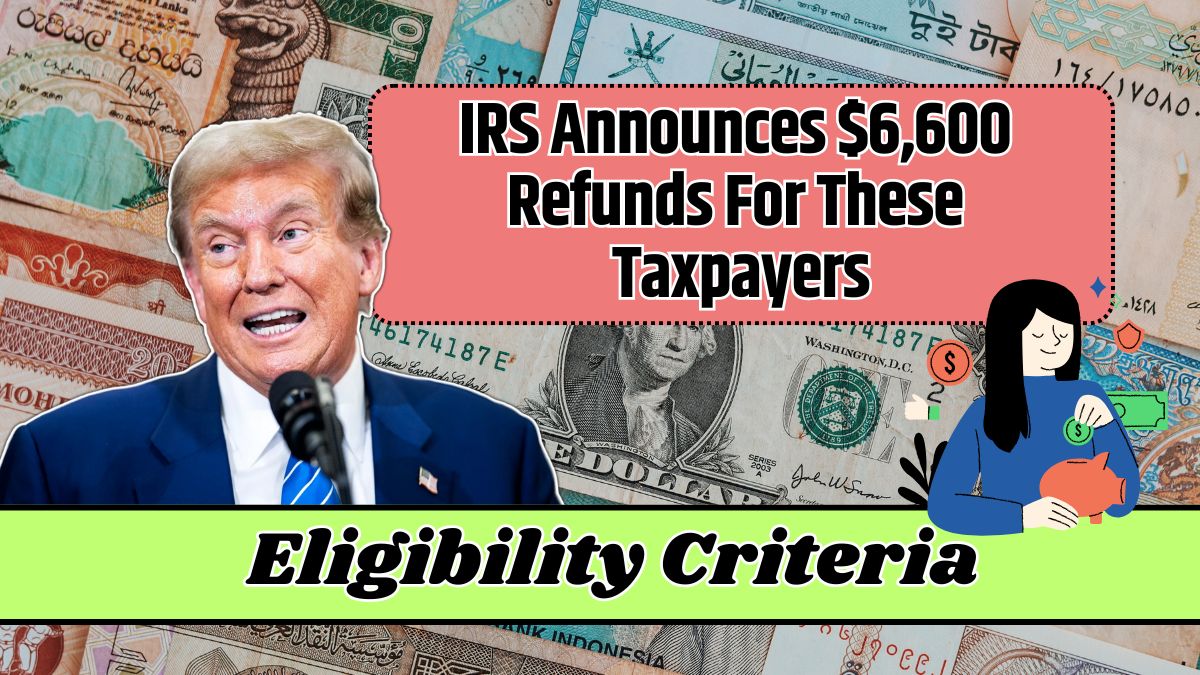The IRS has introduced a new $6,600 refund targeting eligible taxpayers who filed in 2020 or 2021.
This initiative aims to correct miscalculations related to credits like the Child Tax Credit (CTC), Earned Income Tax Credit (EITC), and benefits under the American Rescue Plan (ARP).
Eligible taxpayers will receive refunds automatically, but understanding eligibility and how to track the process is crucial.
Here’s a breakdown of the eligibility criteria, how to check your status, and the steps to claim your refund.
Refund Overview
The $6,600 IRS refund addresses past discrepancies in tax credit calculations. Below is a summary of key details:
| Aspect | Details |
|---|---|
| Refund Amount | Up to $6,600, depending on eligibility. |
| Tax Years | For those who filed in 2020 or 2021. |
| Affected Credits | CTC, EITC, ARP benefits. |
| Refund Process | Issued automatically, though updates may be required. |
| How to Check Status | IRS tools like “Where’s My Refund?” or online accounts. |
Eligibility Criteria
To qualify for the refund, you must meet certain conditions related to previous tax filings:
1. Tax Filing Year
- Must have filed taxes for 2020 or 2021.
2. Child Tax Credit (CTC)
- If the IRS miscalculated your credit under the ARP, which temporarily raised the CTC to $3,600 for children under 6 and $3,000 for children aged 6–17, you may be eligible for a refund.
3. Earned Income Tax Credit (EITC)
- The EITC provides financial relief to low- to moderate-income workers. Adjustments to eligibility and amounts in 2020 and 2021 may have led to underpayments.
4. American Rescue Plan (ARP) Benefits
- Includes stimulus payments and enhanced unemployment benefits. Any errors in these calculations could result in eligibility for a refund.
Checking Your Eligibility
Here’s how to confirm if you qualify for the $6,600 refund:
1. Log Into Your IRS Account
- Check your tax records, credits, and refund notices.
2. Review IRS Notices
- The IRS will notify eligible taxpayers by mail. Keep your address updated to avoid missing correspondence.
3. Use the “Where’s My Refund?” Tool
- This tool provides real-time updates on your refund status.
4. Consult a Tax Professional
- Unsure about your eligibility? A tax professional can review your filings and determine if you qualify for the refund.
Key Credits Impacted
Understanding the credits involved can clarify why you might be eligible for the refund.
1. Child Tax Credit (CTC)
- ARP enhancements increased the CTC in 2021, and errors in processing could entitle you to additional refunds.
2. Earned Income Tax Credit (EITC)
- Designed for low-income workers, the EITC expanded eligibility during the pandemic. Incorrect calculations may result in owed refunds.
3. Stimulus Payments
- Errors in ARP stimulus checks or unemployment benefits calculations could lead to adjustments and refunds.
How to Claim Your Refund
Step 1: Verify Eligibility
Check your IRS account or consult a tax professional to confirm your status.
Step 2: Ensure Information Is Updated
- Address: Submit a change of address form if you’ve moved.
- Bank Account: Update your account information for direct deposit.
Step 3: Monitor Refund Status
Use the IRS “Where’s My Refund?” tool to track your payment.
Step 4: Follow Up if Needed
- If you don’t receive the refund within 6–8 weeks, contact the IRS or file an amended return using Form 1040-X.
Common Examples
Here’s how the refund might apply to different scenarios:
| Scenario | Eligibility Reason |
|---|---|
| Single parent with two children | Received less CTC due to processing errors. |
| Part-time worker with a dependent | Incorrectly calculated EITC during tax filing. |
| ARP unemployment recipient | Underpaid stimulus benefits or unemployment corrections. |
How Refunds Are Issued
Refunds will typically follow the original method of your tax refund:
- Direct Deposit: Sent directly to the bank account on file.
- Check by Mail: If no account is listed, a check will be mailed to your address.
Timeline for Refunds
Refunds are generally processed within 6–8 weeks after eligibility determination. However, delays can occur due to backlogs or issues with your tax return.
Pro Tips:
- Regularly check your refund status online.
- Contact the IRS if you haven’t received your payment after 8 weeks.
What to Do If You Don’t Receive the Refund
If you believe you qualify but haven’t received your refund:
- Check Your IRS Account: Look for errors or updates.
- File an Amended Return: Use Form 1040-X to correct any mistakes on your original filing.
- Contact the IRS: Reach out directly for clarification.
The $6,600 IRS refund initiative is a valuable opportunity for eligible taxpayers. By staying informed and proactive, you can ensure you receive the benefits you’re entitled to.
















